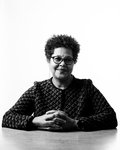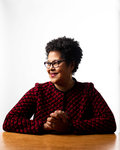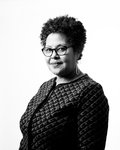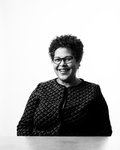



Altaye Tadesse, 58, grew up in western Ethiopia and came to the United States in 1986. Her husband had been accepted to study chemistry at the University of Michigan. They and their two daughters moved to East Lansing for his post-doc studies at MSU before he was hired by the state. Tadesse, who prefers being called Altu, opened Altu’s Ethiopian eatery in 1996.
What motivated you to open an Ethiopian restaurant in East Lansing?
I’ve always loved cooking from early on, and when I first came to Lansing, I really wanted to start an Ethiopian restaurant. There was nothing in Lansing, even ethnic foods were very little — I remember Woody’s, and even the Indian restaurants came after I opened. Woody’s was the only one I remember as ethnic food. And so that got me really excited. And so I started working on it. Five years I tried and tried and tried, finally I got a little spot in where I am right now and then started very small.
The food was more than just feeding somebody, there was a whole emotional, social connection process to it as well as cultural trying to bring community together, is that correct?
Mealtime eating is not just grabbing something and running in my culture. The family gets together and have a big plate they share from, they sit and they talk, and they eat and they laugh, and it takes a process actually, takes time. It’s a family time, and we don’t really do just running like the Americans, like grab a sandwich and eat as we drive. That is not our case. So you can see it in the way that the food is served too. You can’t really get it to go and eat on your way.
You didn’t change that cultural aspect of food when you opened in 1996. How has that helped you succeed all these years?
It’s a new experience for Americans too, for people who just tried it for the first time. And the first few years people asked how to eat it, and I showed them personally how they have to cut the bread and take their sauce. Actually, I would take a small plate and go to people’s tables when they are starting. This is how you eat. It’s family time, take your time and eat. So, it’s an experience that everybody embraced. I didn’t want to change it because the whole idea of starting that Ethiopian restaurant is to bring that culture and somehow open people’s eyes to a different culture and how it can be enriching culture that it would open people’s eyes to having different ethnic food. Food is the learning into the culture of the country too.
When you opened the restaurant, how did the community originally react?
In 1984 was the big starvation in Ethiopia that everybody knew. I had to explain that it’s not the whole country that’s starved. There were people who had to share their food. I mean, it wasn’t like all of us were starting at that point. That’s what I explained to people. I took so much energy into turning that around, but then after second year I could see people being curious and coming in and seeing it and loving it and sharing it. So, yeah, it did take long for the community to embrace it.
What is your favorite story of people discovering Ethiopian food in your restaurant?
I have couples who came in on their first date to the restaurant, and then continued dating and then got married and had children, and their children’s favorite food becomes this one too and still continue doing that. So I have like generations, their parents and the couple that got married and their kids. That’s my favorite story to tell. I have a few families that still like to send me Christmas cards or send me their kids getting married or children growing up. I have a connection that way to the community.
How does your success help build a sense of community for you as a woman, an immigrant, a woman of color?
My hope is all that I’ve done so far has encouraged many other immigrants or people of color or women to compete or to just say, “I am here. I can do it.” When immigrants come here, it’s hard to navigate job situations, with the language and the culture difference, but when they see what has happened with me, I think they get encouraged to step out of their comfort zone and explore what’s available to them, and I believe I helped some see the light that way.
Support City Pulse - Donate Today!
Comments
No comments on this item Please log in to comment by clicking here